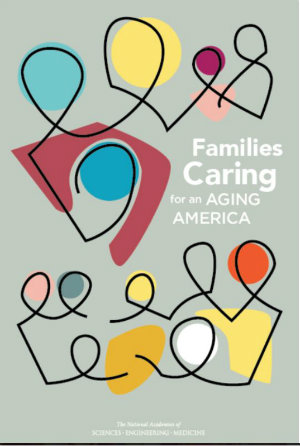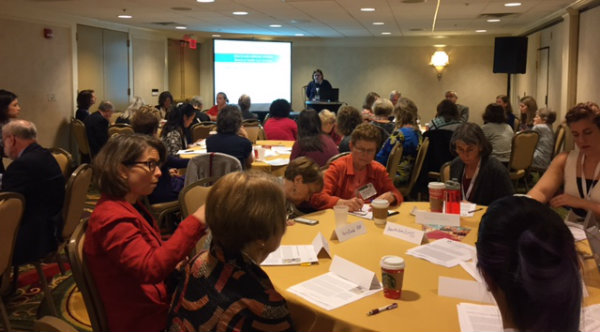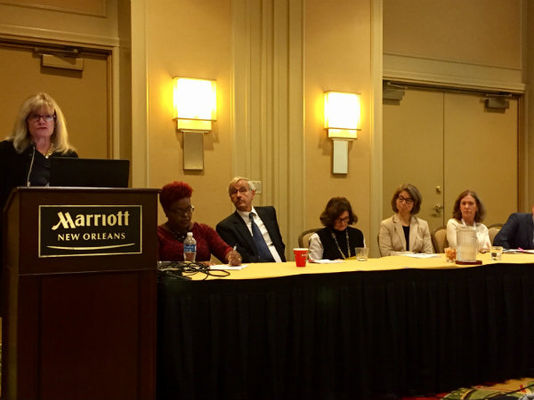Many of our staff, grantees, and colleagues are in the Big Easy this week at the annual scientific meeting of the Gerontological Society of America (GSA), a longtime grantee and partner of The John A. Hartford Foundation. The meeting in New Orleans has been energizing and fruitful and we congratulate all of the new GSA Fellows, awardees, and presenters.
With more than 450 scientific sessions and over 4,000 attendees representing health professionals, behavioral and social scientists, biologists, policymakers and others, the GSA meeting gives all of us an opportunity to learn about cutting-edge aging research and identify concrete ways to help our nation and the world age well.
This year’s conference theme, "New Lens on Aging: Changing Attitudes, Expanding Possibilities,” chosen by GSA President Nancy Morrow-Howell, PhD, resonates with us and we hope with the entire field. She notes that the theme was informed by her own and other’s research that has “…demonstrated that ageism is still alive and well in our attitudes, behaviors, programs, and policies.”
We agree and are excited to see the collaborative communications project Reframing Aging featured at this year’s meeting. The project is just beginning to release its communications tools, which will help us all more effectively deliver messages that positively change the way the public thinks and talks about aging and older adults.
 Family caregiving is a specific area where we need a new lens and changed attitudes. Fortunately, the topic was featured prominently at the conference by GSA, an important partner in disseminating the recently released Families Caring for an Aging America report, from the National Academies of Sciences, Engineering, and Medicine. The report calls for a national strategy to support the tens of millions of family and friends who are heroically providing care and assistance every day to their older loved ones.
Family caregiving is a specific area where we need a new lens and changed attitudes. Fortunately, the topic was featured prominently at the conference by GSA, an important partner in disseminating the recently released Families Caring for an Aging America report, from the National Academies of Sciences, Engineering, and Medicine. The report calls for a national strategy to support the tens of millions of family and friends who are heroically providing care and assistance every day to their older loved ones.
GSA organized two sessions and a press briefing at its meeting focused on the report findings. It was encouraging to see the interest from GSA’s researchers and clinicians and from the journalist fellows the organization brings to this conference (and we are pleased to help support that program).
We look forward to building on the buzz at GSA with support for activities that will make the report recommendations real. This includes:
- identification, assessment, and support of family caregivers in delivery of care;
- inclusion of both family and caregiver experiences in quality measures;
- support of family caregivers through health information technology; and
- preparation of care professionals to provide person- and family-centered care.
 As Families Caring for an Aging America also recommends, all of these activities must apply another important lens, one that focuses on the current and growing diversity of older adults and their family caregivers.
As Families Caring for an Aging America also recommends, all of these activities must apply another important lens, one that focuses on the current and growing diversity of older adults and their family caregivers.
While family caregiving was a highlight of the meeting, there were many others. Later tonight, I am looking forward to celebrating with GSA and all of The John A. Hartford Foundation Change AGEnts at a special reception. After three amazing years of supporting and connecting JAHF grantees and scholars and helping them become leaders of practice change to improve care of older adults, the grant initiative will come to a successful conclusion in January 2017.
The initiative has been a remarkable partnership between GSA and JAHF and has achieved significant outcomes through its Action Awards and Networks. The program has been instrumental in helping the Foundation transition from our legacy academic programs to practice change initiatives in our new priority areas of family caregiving, end‐of‐life and serious illness, and age‐friendly health systems.
We cannot thank GSA enough for its partnership on the Change AGEnts initiative and the family caregiving report, and we look forward to our future collaborations.

